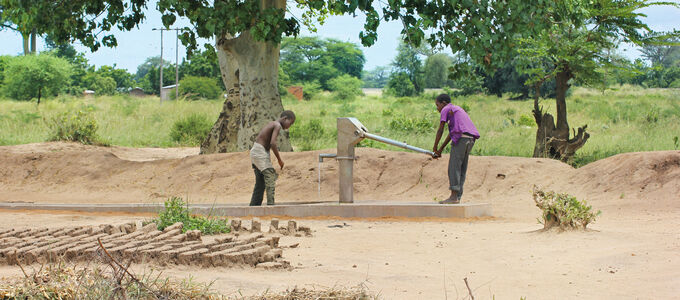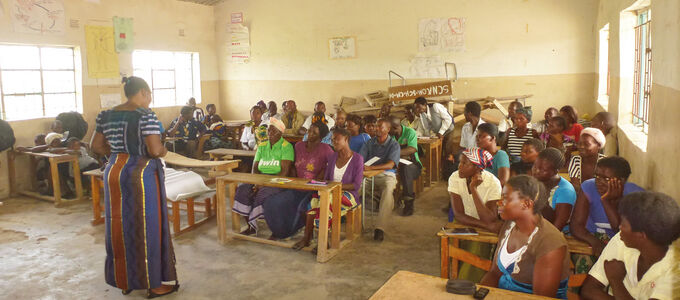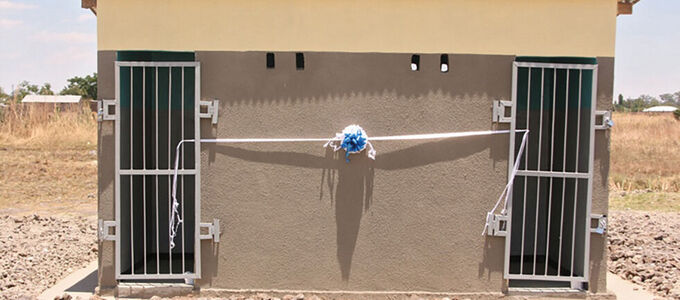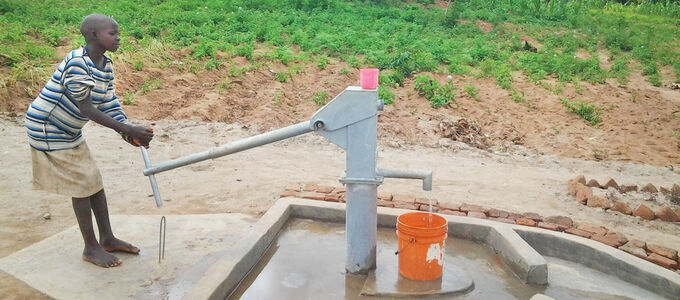
Schools without toilets? Days of instruction without drinking water? In some places this is completely normal. However, it does make learning more difficult than it needs to be, especially for girls. One way of combatting the problem is called WASH.
The school day in Zambia is long. Especially in the rural areas, children already set off early in the morning in order to arrive at school on time. Depending on their ages, they remain there until noon or even the afternoon. Often they are hungry and thirsty. Few of the children bring a meal along, and there is no drinking water either at home in the morning or at school during the day. The students then return home quite exhausted in the afternoon heat. And the children are only able to relieve themselves out of doors.
Equal opportunities for girls
Added to this are other problems: “The women depend on the support of their daughters, who help them carry heavy canisters. This means that the girls have a higher rate of absenteeism or cannot go to school at all,” explains Tatjana Augustin, Managing Director of NAK-karitativ. Once girls start menstruating, they face yet another problem: they pretend to have stomach pains or other illnesses in order not to have to go to school during their periods. The subject is still taboo, which means that they cannot talk to anyone about it. Pads or tampons are unaffordable for many. So it is that they make do with washable fabrics. If these cannot be changed between lessons, attending school is practically impossible.
“The practice of agriculture is impossible without water,” explains Tatjana Augustin. “Without water and toilets, preventable diseases can spread. Added to this is the massive gender inequality with respect to accessing education and income opportunities, which is caused by a lack of infrastructure. We must therefore always take WASH—in other words, the three components of “WAter, Sanitary facilities, and Hygiene”—into account in all of our projects.
Learning from peers
In the district of Kalabo, the implementation of the WASH programme is now becoming a reality: through the cooperation of NAK-karitativ and the New Apostolic Church Relief Organisation (NACRO), the learning situation for around 5,000 students and 150 teachers at 25 schools is set to improve significantly over the next few years. The programme, which will see the schools equipped with sanitary facilities and access to drinking water, is scheduled to run for three years. Fifteen wells are being repaired and ten more are being built. Management groups are responsible for the maintenance and repair of the pumps.
In order to allow the children to become accustomed to better hygiene practices, NACRO and NAK-karitativ are offering courses on hygiene practices in the classroom. Through the establishment of so-called WASH clubs, students can pass on the knowledge they have gained themselves. This peer-to-peer approach has proven to be very successful, as it is easier for children and young people to take direction from classmates of the same age. And they also bring this knowledge back home with them to their families: “The children go home and tell their parents what they have learned—and implement the same hygiene practices there. This is an important component of the education we need in our villages,” explains Caroline, one of the teachers. Beyond that, the people in the surrounding villages likewise benefit because the clean water is also available to them.
NACRO and NAK-karitativ have had 90 gender-separated sanitary facilities built at the schools, which also offer the children sufficient protection.
On the same page as the United Nations
The project fits in well with the implementation of the seventeen sustainability goals of the United Nations. Sustainable Development Goal number 6 stipulates that everyone around the world is to have access to clean drinking water and sanitation by 2030. Whether this goal can be achieved depends on other factors, however. “It is not enough to drill wells and build sanitary facilities. Water is even becoming an increasingly scarce resource here in Central Europe, even though it is not yet noticeable everywhere. Mind you, it is already an issue for some of our European neighbours. We should therefore deal more conscientiously with the creation and remain focused on its value every day, using the resources available to us sparingly and actively protecting them,” says Tatjana Augustin.














